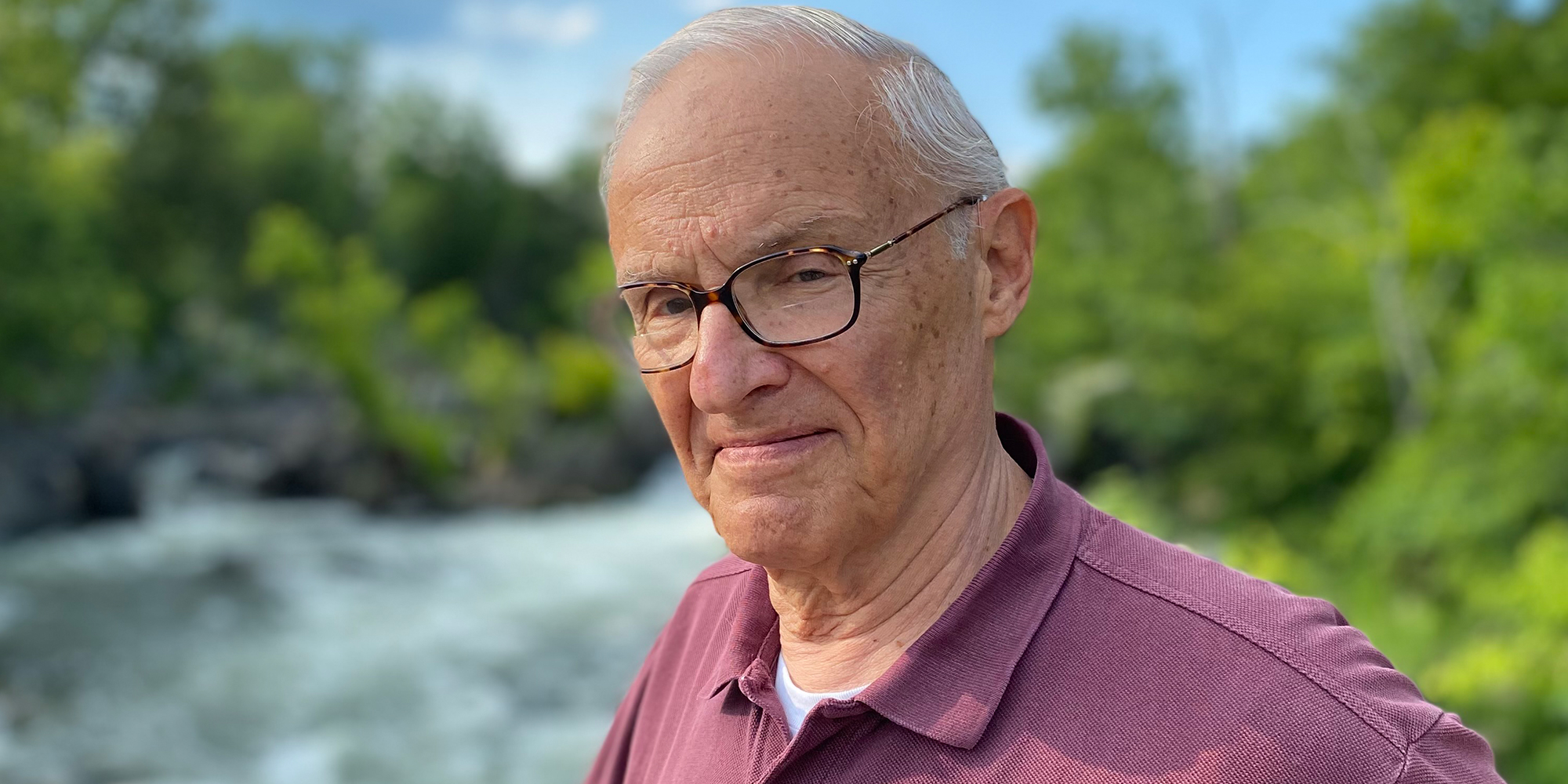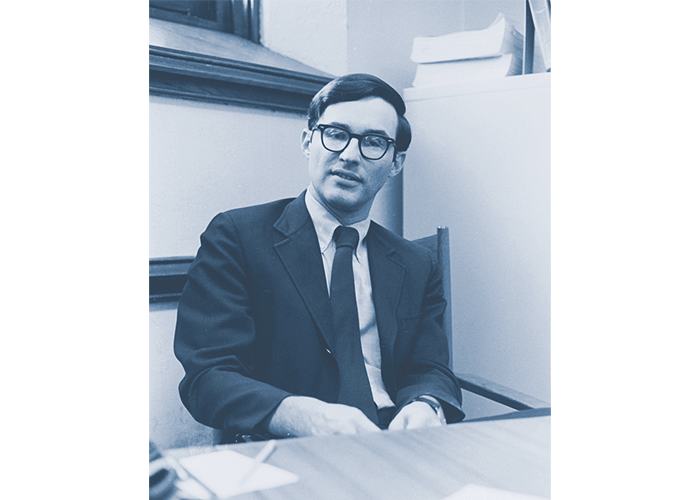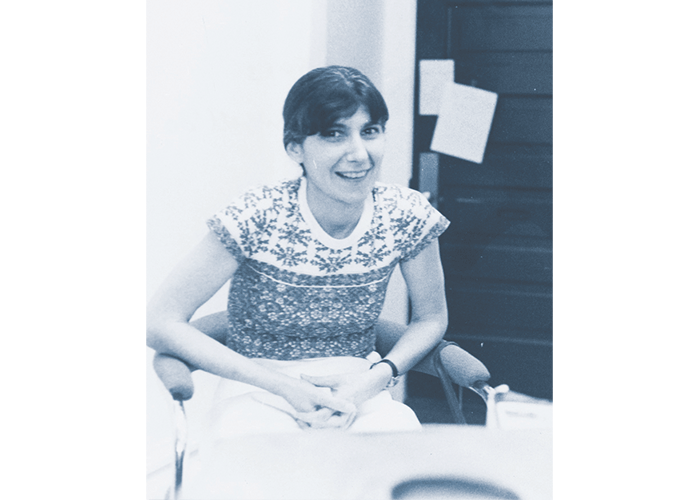
A physician who devoted most of his career to humanistic questions, Leon Kass, LAB’54, SB’58, MD’62, began his chairmanship of the President’s Council on Bioethics in 2001 by assigning members to read Nathaniel Hawthorne’s short story “The Birth-Mark” and trying “to introduce into the council’s work a concern for the rich questions of our humanity.” (Photo courtesy Leon Kass, LAB’54, SB’58, MD’62)
Leon Kass, LAB’54, SB’58, MD’62, continues the conversation.
Since retiring from teaching at the University in 2010, Leon Kass has led a life that is anything but retiring. This past January, the Addie Harding Clark Professor Emeritus of Social Thought and in the College was named dean of faculty at Israel’s Shalem College. The same month, Yale University Press released his book Founding God’s Nation: Reading Exodus. In April came Reading Ruth: Birth, Redemption, and the Way of Israel (Paul Dry Books), an interpretation of the Book of Ruth cowritten with Kass’s granddaughter Hannah Mandelbaum.
Kass, LAB’54, SB’58, MD’62, was chairman of President George W. Bush’s Council on Bioethics, a position he held from 2001 to 2005. Now dividing his time between Washington, DC, and Israel, he has Chicago and the University often on his mind. It’s where the native South Sider spent the heart of his life and career—where he met his late wife, Amy Apfel Kass, AB’62; where they raised a family; where they cofounded the Human Being and Citizen course and taught together in the Fundamentals program for decades.
This interview has been edited and condensed.
On the first page of Reading Ruth, you write that when your granddaughter asked you to read something with her after Amy Kass’s death in 2015, the offer was “a log brought to a drowning man.” What is it about reading together that is such a salve?
I don’t know that this is translatable for other people, but for me, it was a restoration to my favorite activity, and one that I had shared over a lifetime with Amy, which is to say, seeking wisdom and understanding through companionate reading and conversation.
On top of that, it was really an act of grace showered on me and on Amy’s memory by then-16-year-old Hannah, who has a very old soul. She somehow sensed that this offer might be just what would bring this old guy back to life—in fact, both of us, as she was very close to Amy too. And it sure did.
Why the Book of Ruth?
First, it’s an exquisitely beautiful book, one that Amy and I had both loved. About 20 years before, she and I had made a discovery in the text that we thought could unlock what it’s all about. We said, we’ll get to work on this someday, and the someday never came. And I forgot what this insight was.
The book is short, it’s beautiful, and Hannah knew it. The hope was that we could recover the insight that Amy and I had had. And I was delighted that in the second session, Hannah found it. She led us both to see that the book is about nothing so much as the redemptive power of new birth and how it affirms the intergenerational continuity and the remembrance of the dead, which turned out to be the very activity in which we were engaged.

What is the value of this kind of close reading? Is it an endangered art?
Close reading was very, very close to the heart of what Amy and I did at the University of Chicago. At other schools, students read a play from Shakespeare each week. Amy would teach King Lear for a quarter, and every line was read aloud and discussed.
If you want to learn from the text, and not only learn about it, you can’t read just for argument or ammunition. You have to learn what it says and what it means, and why the author might have put things this way rather than some other way. It’s also to learn, by going slowly, how a book wants to be read, if one can put it provocatively.
To read a great text, one wants to live with it, and have it dwell with you. You do this in the belief that it just might teach you something you really want to know but might not otherwise learn. To do that, you have to slow down, ponder the words. It’s only in this way that a book will really open up to you, as opposed to fitting into your preconceived notions of what the world is like. And it is very much in danger today. What we do at Chicago is really precious.
I remember Amy Kass talking about teaching books she hadn’t previously read.
Her favorite book was the Odyssey, but she stopped teaching it when she felt that she couldn’t give it a fresh reading. She would be too eager to tell the students and show them things. I had the same experience too.
You need new books, and the classes are best if the teacher regards herself or himself as simply the most experienced student in the room. If we’re not in there with the expectation that we might still be learning something from reading this again, it’s over. What you really want to do for students is to display yourself as a more mature version of themselves, still eager and learning new things.
Chicago was wonderful in that way, because the boundaries were fluid. If I wanted to teach a new book and read it for the first time, with others, it was thrilling. The best classes were often the ones I was teaching for the first time.
What makes a text worthy of that kind of study?
One can quarrel about what belongs on the list of great books, but there are classic texts from all ages that have survived, not because some popularity contest has been won, but because they have rewarded the efforts of the most serious and careful and thoughtful readers to plumb their depths and to discover that they’re inexhaustible. You can read these books over and over and over again. The book says the same words, but you’re different, and you find deeper and richer things in them.
What do you miss most about teaching? Are there things you don’t miss?
I miss the freshness and the openness of young students. If you live in the classroom, you don’t get old, because you’re teaching young people who are on the cusp of self-reflection. They’re filled with aspiration and apprehensions, hopes for what life has to offer them.
It’s not just a canard that one learns from one’s students, but you have to ask a real question rather than, “guess what’s in my pocket.” People say honest things, they’ll say things you’ve never thought before and see things in the books you didn’t see.
The only thing I really, really don’t miss is putting grades on papers. Commenting on them is an important part of the job, and I spent a lot of time on it. But reducing the whole effort of learning and trying to convey your own thoughts to your teacher to some sterile and superficial mark of accomplishment—it was antithetical to the entire enterprise. I know it’s a necessary evil of the system, but everything was fine until that moment, and I’m glad to be rid of it forever.

What do you see as Amy Kass’s legacy?
Legacies are hard things. As a teacher, you have no idea, usually, what’s going on on the other side of the table, and you won’t know for 20 years, 30 years, 50 years—you probably will never know what the lasting effects are, so I wouldn’t claim much. But I’ll say that Amy was an absolutely masterful teacher. I was pretty good, but she was fabulous. And she was fabulous because if a student asked her a question, she turned it back on them. She didn’t feel obliged to give answers. She was there to make them think and think harder. A student would say something, and if it was halfway good, she would say, “Another sentence …,” and it was flattering to the student to think they had another sentence in them, besides the best that they’d give you. They searched for it, and they found it.
The other thing to say about her is that the women students, especially, saw and treasured in Amy the fact that she integrated naturally and easily a beloved life of teaching and learning, and a beloved life of marriage and family. She wasn’t proving a point. She just did it. The students were invited into our home. They saw all aspects of her, and a lot of the students gravitated to her for this reason.
What drew you away from your other interests to write the Hebrew Bible commentaries on Genesis, Exodus, and Ruth?
I was not raised on the Bible. In fact, I started reading the Bible seriously because we put it on the reading list in Human Being and Citizen. Over the years I began to see that it could more than hold its own in competition with the great philosophical and literary works that Amy and I had been teaching. Eventually I produced the commentary on Genesis [The Beginning of Wisdom: Reading Genesis (University of Chicago Press, 2003)] that grew out of teaching it, I think, 10 times for four hours a week over 20 weeks.
Increasingly I came to see that my Plato and Aristotle, much beloved though they are, are not quickly speaking to larger cultural issues that were coming to the fore. It seemed to me that the moral fabric of the country was frayed. And it seemed maybe the teachings of the Hebrew Bible might have something to say, culturally speaking, for our time. The more I worked on these things, the more these texts seemed a powerful mirror in which we could examine our own situation, and discover certain roots of our own tradition that might be repaired to in time of need.
One of the big discoveries to be made in the Book of Exodus, which is the founding book of the people of Israel, is that the national founding rests on three pillars: a shared national story of slavery and deliverance; an accepted law and morals, the giving of the Ten Commandments and the ordinances at Sinai; and the building of the tabernacle, which speaks to the human aspiration to something higher than our own comfort and safety. It raises a question about whether any society can survive vigorously and durably in the absence of these three pillars.
To bring it home to the present day, what I think we can boast of is technological progress and economic prosperity of the sort the world has never known, and private pursuits of happiness without oppressive naysaying churches and other regulators. But the question is, can these particular features of modern American life sustain us when our national narrative is contested or even despised, when our morals are weakened, and where the national dedication, to put it mildly, has been abandoned?
I think it’s a very dicey time. People don’t know who they are as members of the community. If those particular pillars are shattered, you will have individuals seeking what’s their own, but what we have in common and what we can teach the next generation to carry on—I think that’s very difficult.
Reading Exodus in the present age enables you to make a diagnosis—to say, we have a problem here, and let’s see if we have the resources and the will to do something about it.
Tell me about your work at Shalem College, which is Israel’s only four-year liberal arts college.
Shalem was founded on the assumption that Israel is very technically competent, but what that competence is for, and what kind of a society you want to build with all of your technological prowess, and how to deal with questions of justice, national purpose, family life, and immigration—all of these things depend on a different kind of study. Those are human, ethical, political questions.
I watched this college come into being. I was on the board of the foundation that saw its birth [in 2013] and taught there part time after Amy passed away. The faculty have been educated in Germanic style, where the professor lectures and the students copy down. I tried to show them that you can conduct a class by asking questions and doing close reading.
When Russ Roberts, AM’78, PhD’81, became president, I offered to go with him and work on faculty development. As of January 2021, that’s what I’ve committed to doing. I love the people, I love the mission of the place, but it’s an uphill battle against the tradition of pedagogy there.
How are you approaching that work?
In previous years I took a classic text and just read it with them as I would read it with students in Chicago. It was hard because the faculty already had opinions about these texts, which they got from secondary sources, sometimes without having read the text. I had a lot of undoing to do. It’s very hard to get professors to regard themselves as students.
The first year was difficult. The second year was easier. I did Aristotle’s Ethics with them slowly, and that went pretty well. The third year I had a group working with me on my own writings on the Bible. We would go, line by line, through my texts on Exodus. Then the next year, I did something on science and morals. That went pretty well.
But the way to do it, and the way I’m going to do it starting now, is to have each of the faculty members teach the rest of us in the group a short piece of a text that they love. I’ll ask them to make it clear to us why they love it, and why we should love it—show us the way in.
The idea is to make the faculty more conscious of what it is they want to happen to the student as a result of teaching their classes. I’ve got a lot of goodwill stored up there. I’ve got willing people; we just need practice.
How do you think about the many sides of your work and what holds them together?
When someone introduces me for a lecture, and they recite my path through life—medicine, biochemistry, St. John’s Great Books, Chicago, bioethics, the Hebrew Bible—from the outside, it sounds like this is a guy who didn’t know what he was doing and had a midlife crisis every five years. From the inside, it’s one life.
I like to say everybody has one question. If you’ve got any questions, you’ve got one. And my question is how to live a humanly rich life for yourself and help create a community that’s conducive to most people having a crack at living a humanly rich life for themselves, separately and together.
This fits with the fact that, of all the things I love in life, it’s serious conversation that I love the most: serious conversation about the questions that matter, in the service of trying to make people thoughtful about how they’re living, and how to make the most of this very precious gift of life on Earth, which we have not by merit or by right.
We live in a world in which the dangers and the threats to living a humanly rich life are legion, from the distraction of the cell phone and social media to the threats of degradation, of hatred and prejudice and inequality, to the dehumanization of new technologies. How do we keep the world safe for the highest human possibilities of heart and mind and soul?
It’s of a piece. It’s taken different forms in different places. But from the inside, it seems seamless. I was 15 when I started college. I was too young. I was majoring in the sciences and did fine. That doesn’t require maturity. I didn’t take to the humanistic side very well until Joseph Schwab, PhB’30, SM’36, PhD’38, woke me up in my last year and showed me that there were questions to which the answers I thoughtlessly held were inadequate.
That was the beginning of my education, but I owe the University of Chicago everything. I owe it for having shown me that learning for its own sake rather than for something useful was a supreme part of a rich life. I owe it for showing me that asking questions that go to the root of things is the best possible way to think about things.
I learned this there. I acquired lifelong friends. I acquired the love of my life. We were invited back to Chicago to practice that for 34 years, an inestimable blessing.
